20 Month Old Doesn't Eat Anything but Baby Food
You are here: Home / Advice / Picky Eating / Toddler Not Eating? Here's What's Normal and What's Not
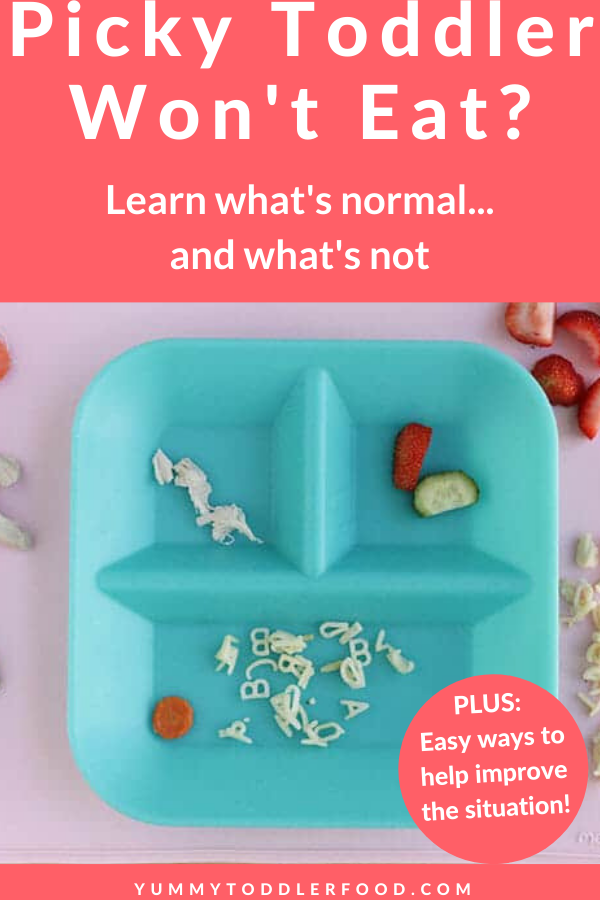
Is your picky toddler not eating? It happens to all of us at one time or another. Here's why it might be happening…and what you can do to make it better. (Or at least to learn what's normal so you can relax.)
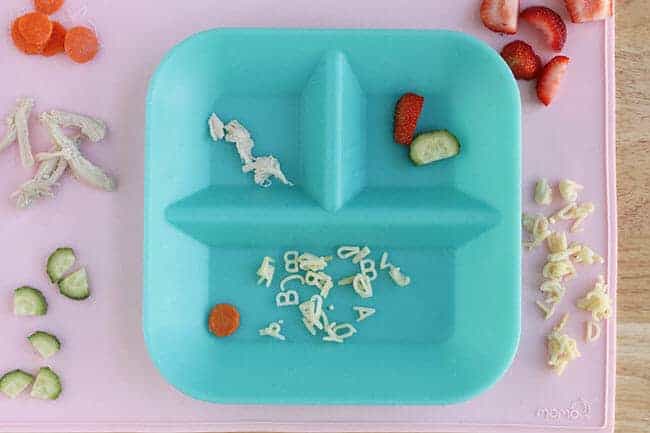
Picky Eating in Toddlers
You get everyone to the table and bring out the food. Your toddler won't eat, throws a fit, or fusses. No matter how hard you try, this is often the reality of feeding toddlers. The good news is that a toddler not eating is normal. The bad news? It's a difficult thing to know exactly why your toddler isn't eating—and what exactly you should do about it. But there are simple steps you can take to improve the situation.
Toddler Not Eating? Here's What to Do
Family meals are a chance to be together at the end of a long day, to enjoy food, and to create daily rituals and routines. But when a toddler won't eat, it can throw off even the best of intentions—and can make dinner time (or any meal when this happens) a huge source of stress. Since I know that the reasons a toddler won't eat are unique to each kiddo and situation, I'm going to try to be as comprehensive as possible here.
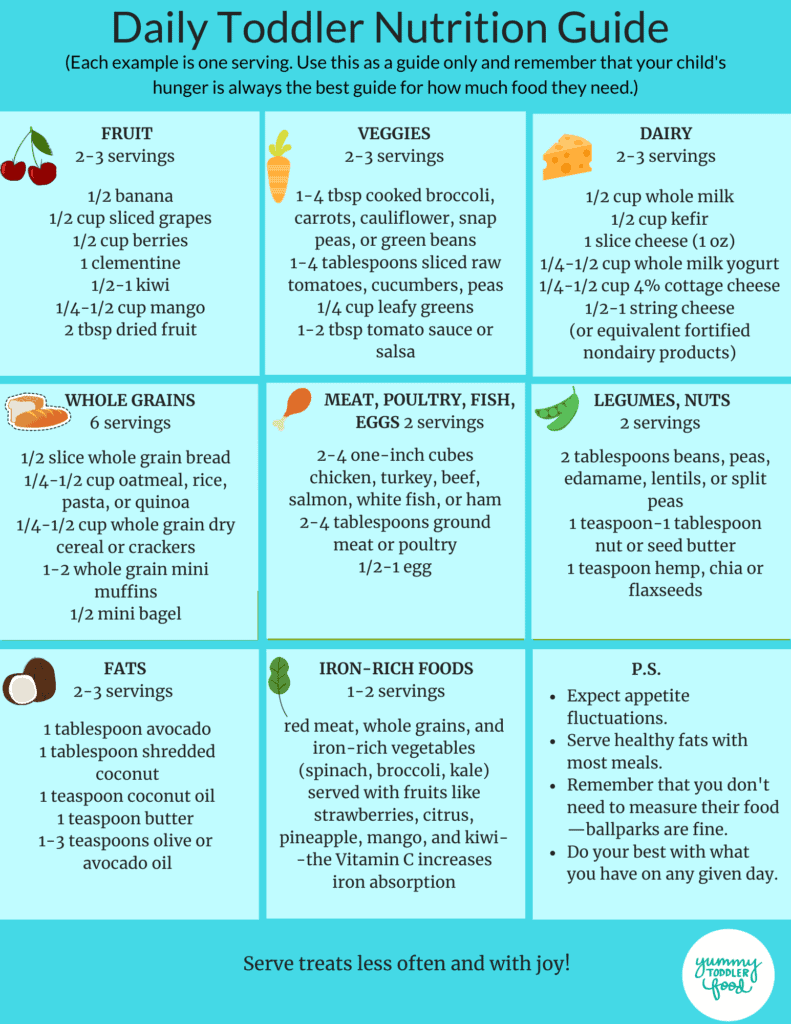
Daily Toddler Nutrition
For a quick reference, you can download my Printable Toddler Nutrition Guide so you can refer to it for reassurance and information. Use it as a guide, not a hard and fast rule, since kids aren't robots and will not eat like a chart. Aim to serve healthy fat with most meals or snacks since little kids need it for proper brain development.
Why does my toddler refuse to eat?
It's very possible that your toddler's not eating because he simply isn't as hungry as he was when he was a baby. Toddlers grow less rapidly than babies and may be less hungry and need less food than you expect. If you give them a larger portion size than they need, they may eat some and leave the rest—and it may visually look like they haven't eaten anything even though they did.
And toddlers don't always have the words to be able to effectively communicate that they aren't hungry, so they may just refuse to eat. This may look like playing with food, throwing food, or flat out refusing to have anything to do with food.
A normal toddler meal may be two bites of a food. Or it may be a whole plate. A normal toddler may like something immensely one week and not at all the following week. This is to be expected and is 100% normal.
Or, it's entirely possible that once they have it in their head that they don't want something, they won't eat it. Sometimes not wanting dinner is about power. Toddlers are in the developmental stage where it's normal for them to test boundaries. They are learning what they can and cannot do, and effects their actions have.
Talk with the rest of your family about how to create some structure around meals—when they happen, where they happen, who sits where, if music is playing, if phones are put away—to help your child know what to expect. Toddlers thrive on routine and attention.
Try:
- Avoid serving anything but water between meals (to avoid filling bellies up with milk or juice).
- Serve very small portions to start to avoid wasting food or overwhelming the kids with large portions.
- Create some mealtime structure so there are set expectations at the table.
- Let it be okay if a child isn't as hungry as you expect them to be. The Division of Responsibility can be helpful here.
How do I get my picky toddler to eat?
If you are in the habit of short-order-cooking the foods you know your toddler will eat, you may want to consider stopping. Explain to your kids that we're having such and such tonight, but that you will make their requested favorite food soon. Then follow through so they know they can trust you! If favorite foods are always available, your toddler will always want to eat the favorite foods.
Make sure there is 1-2 foods on the table that the child usually likes, even if it's something simple like fruit or cheese. Surround them with the food you want them to eat and let them decide what and how much of it to eat. Using this Division of Responsibility in Feeding approach to meals is a total GAME CHANGER as it clearly delineates what the parent and child are responsible for at the table, lessening pressure on everyone. It also gives them a chance to stay in touch with their own hunger cues without prodding, pushing, or cajoling—which makes mealtimes more enjoyable for you too.
We want our kids to know their own hunger and fullness cues so know how much to feed themselves as they grow into adolescents as adults when we aren't around. And they can be hard to tap into if they are constantly overridden by external cues (like if we push them to eat a certain amount, say), however well-intentioned.
You can also try to involve them in doing something to help get ready for the meal to distract them from their concern about what's for dinner. Try letting them help to set the table, help with simple meal prep (like washing veggies), or wash their hands. Hand washing is an excellent toddler-diversion tactic when they get upset about something!
If you are okay with cooking separate meals for your kids and you don't necessarily want them to eat a wide range of foods, then by all means, serve your child what you know she will eat. If you're wanting your child to eat family meals and a wider range of foods, then you need to take some steps to change the situation. Changing the situation will take some time and it's not an instant fix—but it's entirely possible to do.
TIP: Almost every toddler is picky in one way or another at some point. Toddlers are quirky, it's part of the fun! (And the challenge, of course.)
 Why did my toddler stop eating?
Why did my toddler stop eating?
If your child is playing with their food rather than eating it at the start of the meal, chances are they aren't hungry enough to eat. Take a break and try again in 30 minutes if possible—or for the next snack or mealtime.
If your child just doesn't seem hungry, consider how long it's been since their last meal or snack, how much milk (or juice) they're drinking throughout the day, how much they ate at their last meal or snack, whether they are teething or tired, or otherwise off.
It's very possible a toddler won't eat because they just aren't hungry as often as you expect them to be.
If your toddler won't eat foods he once liked, try serving them in new ways, but also remind yourself that it's normal for toddlers to go through phases of loving and not loving foods. They may be obsessed with blueberries one week and never want them again for two months. It's possible they simply need a break from having certain foods as frequently. That is okay.
Try:
- Avoid serving the same foods two days in a row to help your toddler know that we don't eat the same thing every day.
- Serve very small portions to start with to keep your own expectations of how much they should be eating in check.
- Space out meals to at least 3 hours to let true hunger build.
- Remember that there are simply times when kids aren't hungry or aren't as hungry as we expect. That is not a sign of pickiness.
What if a toddler won't eat anything but snacks?
Often, if a toddler knows there is a snack ahead that includes more traditional "snacky" foods, they won't eat the meal you are serving. It can help to serve regular food at snack time, instead of relying on crackers and fruit snacks, and to serve classic snack foods with meals. This can help even out the appeal of all food intake opportunities. In other words, think of snacks as mini meals and serve all food at all meals.
Kids often relax when they have access to their favorite foods, so there's nothing wrong with serving Goldfish crackers along with strawberries and a hard-cooked egg. Or a chocolate chip snack bar with a banana and carrot sticks. It's all good! Remember: It's your job to give your child lots of opportunities to eat nutritious foods, so make them a regular part of all meals and snacks—while still offering foods your kids you know your kids usually eat. It's all about balance…for everyone involved.
Try:
- Buy more of the foods you want your kids to eat, but still include foods they love so they avoid feeling restricted.
- Serve small meals at snack time instead of traditional snack foods or incorporate more traditional "snacks" into meals—like crackers alongside soup, for example.
- Stick with a routine for meals and snacks by having them at set times (roughly) and avoiding all day grazing.
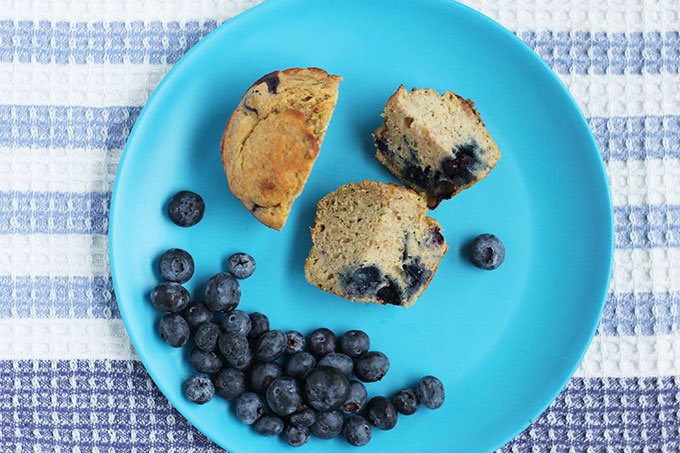 Why does my toddler refuse to eat?
Why does my toddler refuse to eat?
There will be times when your toddler simply doesn't like a meal you make. And whether it's the texture, flavor, appearance, or the way the wind is blowing we may never know, but it will happen. A toddler won't eat at times because they are either not that hungry or they know you will get them something they prefer. A child will always choose a more familiar, fun, and safe food when given the chance. But if you pair safe foods with other ones, they can gently expand their accepted food range.
My method is to make family dinner, including 1-2 foods that the kids usually like even if those foods are a simple side of fruit and milk. Then, if they don't want to eat, I can trust that they aren't hungry. This is a very reliable method if you do it regularly. I do realize this is hard when it's 6 pm and your little one hasn't eaten a thing for dinner. If that happens and they legitimately seem hungry after dinner, wait at least 30 minutes (so they don't feel rewarded for refusing dinner) and offer a super boring bedtime snack like a banana. If they are hungry enough for boring food, you know they are hungry!
If your toddler seems to legitimately dislike a meal, you can institute a "back up meal" to give them the chance to satisfy hunger. Choose something plain that they would likely never choose to eat by themselves and offer that and that along. This should be used very rarely. If you find that it's being relied on more than 2-3 times a month, reassess whether the backup food is too exciting.
Good backup meal options are plain yogurt with granola, plain toast with nut butter, a scrambled egg. Think plain!
Try:
- Avoid getting up during a meal to get different food at your toddler's request. Instead, always aim to include 1-2 foods they usually like in any meal to ensure they always have something to eat.
- Serve a boring bedtime snack if they didn't eat dinner and seem hungry before bedtime.
- Have one boring "backup" meal option for those rare nights when they legitimately don't like the dinner on offer—something they probably wouldn't ask for, but are happy enough to eat if hungry.
My toddler won't eat because he's sick. Should I worry?
When toddlers are sick, normal eating goes out the window. With any illness, appetites can decrease. The general rule that our pediatrician always shares is that as long as they are drinking and going to the bathroom normally, then you shouldn't need to worry too much. Keep portion-sizes small, keep the actual foods simple, don't push food too hard, and trust that their little bodies are doing what they need to in order to feel better. You can get back to normal eating when they are feeling better and always check in with your doctor.
Be patient since lower appetites can linger longer than you might expect, even once a child starts to feel better. And of course, check with your doctor if they aren't drinking, there's another red flag, or you just need reassurance from a medical professional.
Also, toddler teething can cause reductions in hunger. Try not to expect that your toddler will eat normally when they are cutting teeth (especially not with molars!) and instead offer them plenty of liquids, chilled foods and things that don't require too much chewing—smoothies, yogurt, pasta, popsicles—to help avoid irritating their already irritated gums.
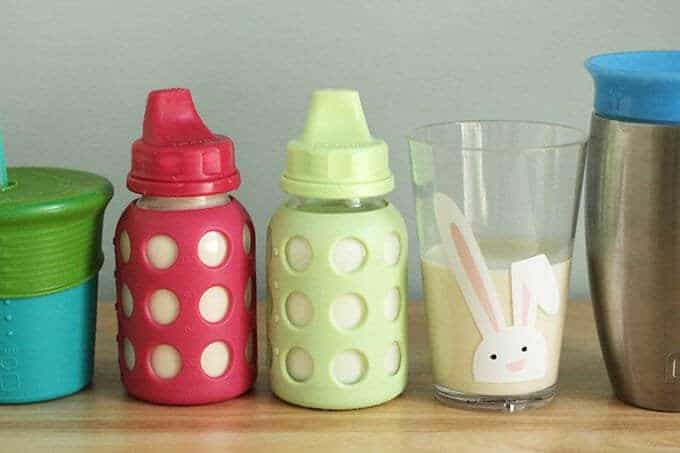 My toddler won't eat anything but milk. Help!
My toddler won't eat anything but milk. Help!
If you have a toddler who's not eating, but who will drink lots of milk, it's possible that milk is filling their bellies and reducing hunger for other food. (The same can be said for any other food that they are insisting is the only food they want.)
The AAP recommends that toddlers have 2-3 serving of dairy a day, which includes milk and other dairy foods like cheese and yogurt. A serving of milk for a toddler is ½ cup. Try serving a small portion of milk just at meals and offering water in between. But do keep portion size in mind, especially if your toddler won't eat anything but milk. This 4-ounce sippy cup is a nice size to use at meals since it ensures that a toddler won't fill up on milk and will be more likely to have room in their bellies for some food. A very small juice glass works too.
Try:
- Serving milk at meals and offering water in between.
- Serving it in a small cup to avoid filling little bellies with just milk.
How can I increase my toddler's appetite?
Well, first, why do you need to increase your toddler's appetite? Are you worried she isn't eating enough of the right foods? That she is too small? Is she low on the growth curve? A good question to ask is whether her growth is consistent with her own history, not as compared to other kids her age. Every toddler grows at their own unique speed and it's possible that she is exactly the size she needs to be—and is eating a perfect amount for herself in her current phase.
If your toddler legitimately doesn't seem to be eating enough (remember, they may eat only ¼ as much as an adult…you may need to adjust your expectations!), you can try serving smaller snacks and meals more often, adding lots of healthy fats to their food, and getting them involved in the kitchen. Here are some foods that may help a toddler gain weight.
Sometimes just being around food in a situation without pressure can encourage a kid to explore and enjoy more at the table.
Why won't my 1-year-old eat?
Toddlers aren't growing as rapidly as babies so while your child may have eaten a lot as an older baby, he might not be as hungry now. One-year-olds are also BUSY. They have a lot going on in their little worlds and many constantly want to be moving. Avoiding distractions at the table can help a toddler focus on their food, and keeping a consistent mealtime routine—when meals happen, where they happen, and what's generally expected during a meal–can go a long way towards happier mealtimes for everyone.
One-year-olds are also just discovering that their actions have consequences, so they may not eat (or they may throw food or do all sorts of other behaviors) simply because they've realized that they can. Keep your reactions during meals as low key and consistent as possible so they don't try to get you to react!
Try:
- Limiting distractions at the table and sitting and engaging with your child during mealtimes.
- Keep your reactions to undesired behavior neutral, consistent, and swift. (If they throw food, end the meal. If they spit out their milk, remove their access to milk. Etc.)
- Give them time to work up an appetite between meals—and avoid letting them graze in between.
- Remember that it's NORMAL for a one year old to be less hungry than they were as babies. They may eat less than they used to and we might need to adjust our expectations.
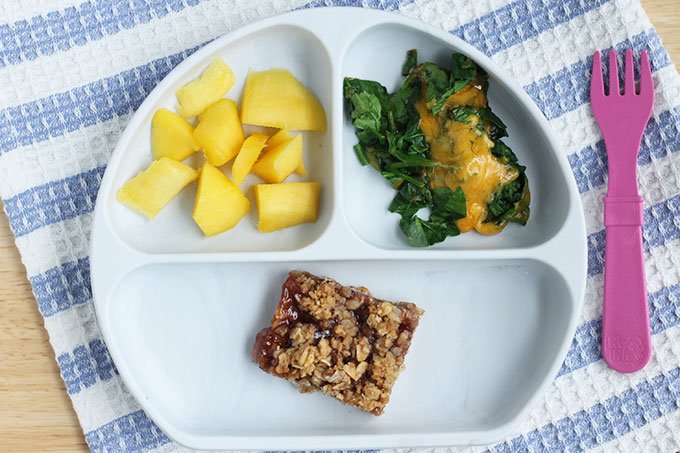 Why won't my 2-year-old eat?
Why won't my 2-year-old eat?
Outside of illness or teething, a two-year-old won't eat for similar power dynamics as above, but they also may be much more sensitive to new foods due to a normal phase called neophobia. This fear of new foods, which usually spikes between 2-6 (though it can start at 1 year old), can cause them to refuse foods they once loved and foods you think they will love. It can also cause them to refuse to want to eat foods mixed together or foods with certain textures.
Try to remember that this is a normal phase of development that will, in all likelihood, eventually pass. Researchers have found that you may need to offer a food 8-15 times before a child may willingly try it. In other words, keep on offering the foods you want them to eat regularly in small portions and without pressure. Because even if they don't want it today, one day they just might surprise you!
For a two and three-year-old, serving meals family style can also help to diffuse power struggles at the table. Simply put the components of the meal in bowls on the table and encourage and help your toddler decide what they'd like to eat. Don't force bites of everything, but give them space to choose what looks appealing. This small amount of ownership over what goes onto their plate can be extremely helpful for strong willed toddlers.
Try:
- Ask your child "how can I make this yummier?" to see if they can help you figure out how to make their food more appealing.
- Serve meals family style to diffuse power struggles and let them choose which foods to put on their plates.
- Include 1-2 safe foods in each meal that they usually like to ensure they always have something to eat if they are hungry.
- Trust their appetites, which may be different than you expect and may vary a lot from day to day.
Why won't my 3-year-old eat?
A three-year-old may not eat for reasons similar to a 2-year-old, but they may also have more words to express themselves—so they may be more dramatic in their response. They may not be as hungry as you expect, their appetite may be unpredictable, or they may be worn out by the time dinner rolls around. (That last one is fairly common!)
Three-year-olds also know how hard they need to push to get what they want. Toddlers at this age benefit from set expectations at mealtimes and routine. Which is to say, if you start getting up to get them foods other than the ones you've made for dinner, they will continue to demand that you do that.
Remember that there's no rule that says that a toddler needs to eat every single thing you serve for dinner. If they eat some of it, there's decently good behavior, and minimal crying, that can be defined as a happy meal. Keep the bar low my friends and you might find that things are better than you realize!
Try:
- Serve meals family style and let them choose what to eat from the foods you put out.
- Let them choose what to have for dinner from two predetermined options so they feel like they have more power.
- Serve very small portions to start to avoid overwhelming them.
- Include 1-2 safe foods they usually like in each meal to function as safety nets in case they don't like the main dish.
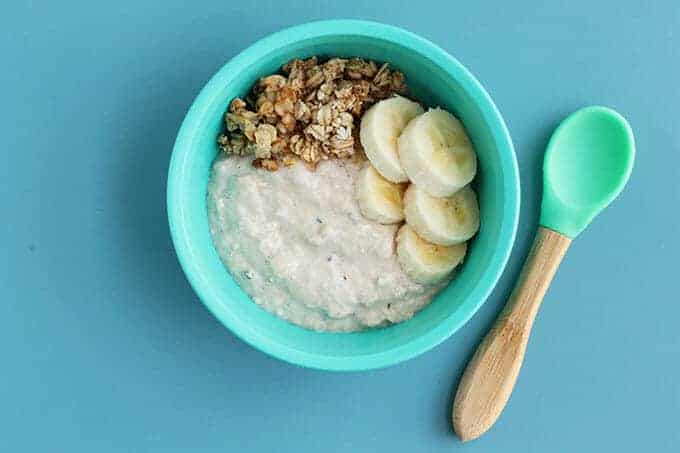 My toddler won't eat breakfast. Why?
My toddler won't eat breakfast. Why?
Do you have normal periods of the day when you're hungrier? You may simply have a child who isn't super hungry first thing in the morning. Try to give them a little time to wake up before sitting down for breakfast and/or serve a smaller portion for breakfast and increase the amount of the morning snack.
If your toddler drinks milk or breastfeeds in the morning, it's possible that they have a full little belly that doesn't have room for food. Keep that in mind if your toddler won't eat breakfast and adjust expectations accordingly—and perhaps also serve smaller amounts of food.
My toddler is constipated—is that why she won't eat?
It's certainly possible! If a little one (or anyone, really) feels uncomfortable in their belly, the idea of putting food into it may not be that appealing. In addition to fiber, having enough water is key to alleviating toddler constipation, so offer lots of water to drink throughout the day and hydrating produce like melon, cucumbers, berries, zucchini, and the like.
You can also try to include healthy fats (avocado, coconut oil) in their diet, or try a Constipation Smoothie, as they too can help food more easily move through the digestive system. And remember: Each kiddo has their own "regular" so it's possible that your toddler needs to go once every two or three days…or three times a day.
P.S. If your toddler has been holding it all day at school, he may not want to eat dinner because he's uncomfortable. Try to give him a chance to use the potty, with as much time as is needed to relax, before dinner.
Why does my toddler always want a bedtime snack?
If your toddler has 2 or more hours between dinner and bedtime, she very well might be hungry before bed. You could either push dinner back a bit or institute a regular bedtime snack. This is a tactic I read about in this book and it makes sense. If there is always a healthy bedtime snack, you won't have to renegotiate it every night. And you also won't have to worry about sending your child to bed hungry if you are prone to that particular worry.
I'd just caution against making the snack something they LOVE because older kids will recognize that they have a dinner time safety net and might not eat the main meal. If a child regularly asks for a snack right after dinner, it may be a habit (or a bedtime delay tactic!), not true hunger. Try "you can be hungry for breakfast" or "if you're really hungry, you can have a banana". Both of those phrases can work wonders to suss out true hunger.
Try:
- Find super simple healthy bedtime snacks here.
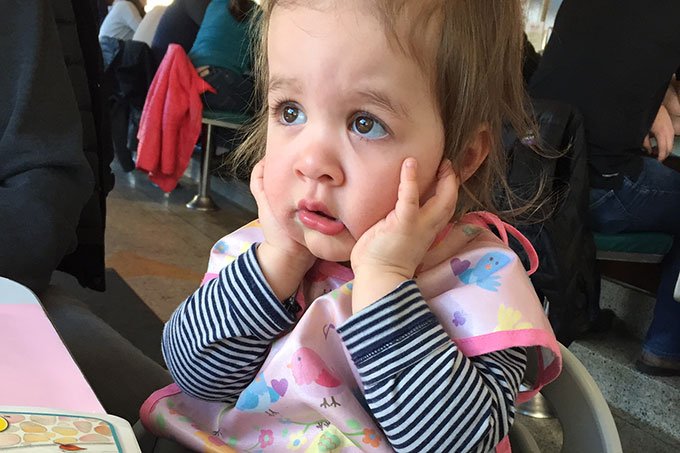 How do I know if my toddler's eating problems are serious?
How do I know if my toddler's eating problems are serious?
Here's some great advice from Katja and Jenny, the authors of Extreme Picky Eating:
"Ask yourself: What is your underlying fear? The point is to figure out what you are worried about, and then find out if you need to worry (or not) from a book, a doctor, or dietitian. If you don't need to worry, you can direct your energies to more productive things like supporting your child's eating. If a problem is discovered, like an oral-motor delay, then you can get that addressed. Studies suggest that between one and two-thirds of all young children will be described as 'picky' in early childhood."
If there is a growth delay, severe reactions to different or specific textures, regular gagging, difficulty eating or digesting, oral-motor delays, muscular disorders, or any other issues that make eating difficult, reach out to your pediatrician and/or a feeding therapist. They will be best suited to help you work through the issues.
Bottom line: When a toddler won't eat, it is not a judgement on our cooking skills or our parenting skills. A lot of it has to do with the developmental stage they are in, of learning and exploring boundaries, and simply seeing how much power they have. Hang in there!
Did I miss anything? Comment if you have a question!
This post is not meant to be a substitute for medical advice. P lease consult with a pediatrician or a feeding therapist as needed.
Filder Under:Advice, Picky Eating
20 Month Old Doesn't Eat Anything but Baby Food
Source: https://www.yummytoddlerfood.com/what-to-do-when-a-toddler-wont-eat/
0 Response to "20 Month Old Doesn't Eat Anything but Baby Food"
Postar um comentário